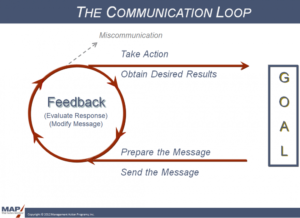Make Feedback Effective
You can’t see it coming, and it’s challenging to manage with grace because it’s a total surprise. Now that you’re sitting in the boss’s seat, responsible for annual performance reviews to your staff, carefully consider how you’re giving feedback. The closer you deliver it to the actual behavior or action that you’re addressing, the more effective it will be.
Ideally, individual feedback can be given in regular Vital Factors® meetings, where you’re reviewing your team’s goals and controls. But it can also be delivered in more casual ways — i.e., stopping someone in the hallway to suggest a better way next time or maybe shooting that person an email to let them know their presentation was spot-on.
And here’s something else: When you deliver feedback more consistently and systematically throughout the year, it takes a lot of pressure off the oft-dreaded annual performance review. You won’t need to address all kinds of “problems” because you will have provided the feedback when various instances took place, coached your employee through those challenges, and helped them improve throughout the year. That will leave you more time in the annual review to do other things, like set reasonable goals for next year or spend some one-on-one time genuinely listening to what this staff member wants to accomplish.Click here to download our free effective communication checklist.It will also give you an opportunity to focus more often on what the employee is doing right, which is a far greater motivator than harping on wrongs or weaknesses. If you’re spending more time addressing an employee’s shortcomings or failures, you need to determine if you’ve got the right hire in the first place or whether you’re simply not aligning that employee’s strengths and skills to the right position or responsibilities.
Finally, regular feedback is a communication tool that not only creates transparency in the workplace but also respect. Why is that so important? Respect breeds loyalty, and strong loyalty plays a big role in growing an organization’s productivity. And that, no doubt, is one of your primary goals.
So think about how you manage feedback. Are you delivering regular communications to individuals about their performance? Or do you tend to put it off or forget about it until the annual performance review arrives? If you’re doing either of these things, it’s time to change your approach. It may take some effort upfront, but delivering frequent feedback can make you and your company more effective.
Ever been surprised by the feedback you received in a performance review?



